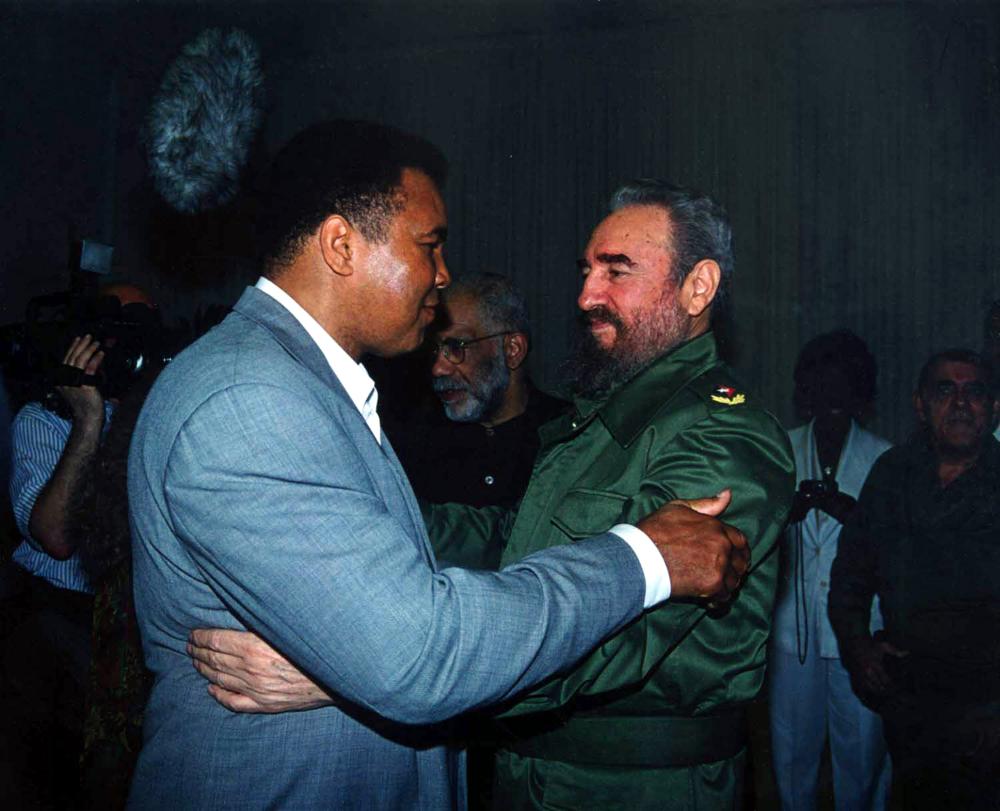
Muhammad Ali, born on 17 January 1942 in Louisville, Kentucky, is dead. An immense figure in social and political life as much as boxing, his death will undoubtedly be the leading story of all mainstream media outlets for days to come. Already, celebrators of his life are searching to find superlatives to describe a man known by most as simply ‘the greatest’. For all the outpouring, one word is noticeably missing from the description of one of the most significant and iconic figures of the twentieth century: revolutionary.
Between hardcore boxing fans the debate will continue as to whether Muhammad Ali, Joe Louis or Rocky Marciano is truly the greatest heavyweight boxer of all time. Regardless of the outcome, in terms of thrilling the fans of the sport with his inimitable style in the ring and electrifying charisma outside, Ali is the undisputed champion. In his prime he presided over the strongest era in heavyweight boxing, beating all competitors, losing only to Ken Norton and Joe Frazier, losses which he later avenged. From winning his Olympic gold medal in 1960 to a series of brutal and punishing fights which would lead to him becoming a three-time world champion, Ali fought the strongest and won. He would describe his bout with Joe Frazier in 1975 as ‘the closest thing to dying that I know’. His greatest fight however, was not against an opponent in the ring but against the establishment, racism and imperialism.
Malcolm X first met Muhammad Ali, aged 20, then called Cassius Clay, in 1962. Muhammad Ali was stunned by the confidence and defiance of Malcolm X in his opposition to the racist and imperialist US state. Speaking in an interview in 1989, Ali described the instant pull of the man and his ideas ‘he walked with nobody, he was fearless. That really attracted me.’ This relationship, later to turn sour as a result of Malcolm X’s split with Elijah Muhammad and the Nation of Islam, was to be the forging of Muhammad Ali’s revolutionary consciousness. Ali had grown up in a United States of segregation, lynchings and the general belief that black people were innately inferior. His internal smouldering against the forces of oppression was kept hidden behind his playful exterior until 1964 when he was to formally announce his membership of the Nation of Islam and change his name from Cassius Clay to Cassius X and finally to Muhammad Ali. While he remained with the Nation of Islam until the mid 1970s, his respect for black revolutionary movements was clear. His slogan ‘I am the greatest’ was taken up by the Black Panthers and adapted: ‘we are the greatest’. On numerous occasions he said that if people were not willing to join the Nation of Islam, that they should join the Black Panthers. To Ali the most important thing was that black and oppressed people were fighting back. This was stated most clearly in an interview with the political journal, The Black Scholar, where he stated: ‘Go on and join something. If it isn’t the Muslims, at least join the Black Panthers. Join something bad.’
Ali was a symbol of black resistance to the US white ruling class. He would challenge it in 1967 when he refused conscription to the imperialist war in Vietnam
‘Why should they ask me to put on a uniform and go 10,000 miles from home and drop bombs and bullets on Brown people in Vietnam while so-called Negro people in Louisville are treated like dogs and denied simple human rights? No I’m not going 10,000 miles from home to help murder and burn another poor nation simply to continue the domination of white slave masters of the darker people the world over.’
His ability to identify the forces of oppression and draw the connection between the struggle against imperialism and racism, and the solidarity that must be built between oppressed people in both oppressed countries and oppressor countries, showed a high degree of political consciousness. This argument was the central connection for the anti-war movement to draw for it to become a truly revolutionary and progressive movement that challenged the US imperialist state. Ali’s actions were as significant to the development of this argument as Martin Luther King’s ‘A Time to Break Silence’ speech. Muhammad Ali was not to pay for his opposition to imperialism with his life, but he was forced to pay nevertheless. He was stripped of his champion belts and banned from boxing for three years. Boxing fans were robbed of three years of watching him in the ring but the anti-war movement was given an icon.
In later life Ali visited Cuba in 1996 and 1998 to donate a total of $1.7m medical supplies, banned by the US blockade. Ali and the Cuban Olympic champion boxer Teofilo Stevenson were inseparable during these visits. When asked if he regretted turning down a million dollars to fight Ali, Stevenson replied, ‘Ali is my revolutionary friend. I don’t want to beat him’. Raul Castro is one of the few political leaders to have spoken of the importance of Muhammad Ali to the black community in the US, and about his brave choice to reject imperialist war.
Already attempts to paint Muhammad Ali as an apolitical ‘humanitarian’ have begun. The establishment that once feared him found him more palatable after his illness cruelly stripped him of his mobility. Establishment tributes will emphasise his humour and charisma and speak of his ‘controversial’ political standpoints (the BBC), but socialists and all who want to see a better world should remember him for what he was, a fighter for truth and justice, and a revolutionary.
Tommy Cashin




